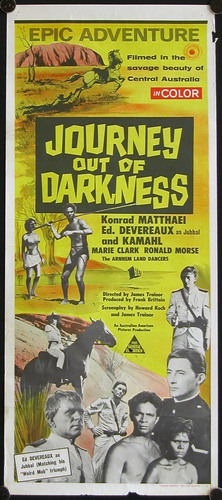
JOURNEY OUT OF DARKNESS
Australia, 1967, 92 minutes, Colour.
Ed Devereaux, Kamahl, Konrad Matthei.
Directed by James Trainor.
Journey Out Of Darkness was one of the few commercial feature films made in Australia in the latter part of the '70s. With hopes after They're A Weird Mob, film-makers began to try to produce films - within five years there was to be a renaissance in the industry.
The writer-director of this film trained in documentaries in Australia and in the United States. His co-writer was the celebrated Howard Koch. What is offered is a basic story about aborigines at the turn of the century and the question of tribal law and white law.
While the film has liberal attitudes, it suffered the drawback of having Ed Devereaux play the aboriginal tracker and popular singer, Kamahl, the aboriginal killer.
There is good use of scenery, the Arnhem Land Dancers perform authentically and there is some atmosphere of racial questions at the turn of the century. The musical score by Bob Young, however, reminds us that this is in many ways an Australian variation on a western.
1. The Australian film industry in the '60s, the quality of this film, its place in the development of Australian cinema? Impact later? Interesting and entertaining?
2. The background of treatment of aborigines in Australian films? Stories about aboriginal rites, tribal law? The liberal attitudes of the film? The suitability of Ed Devereaux and Kamahl portraying aborigines?
3. The American influence in writing, musical score? The film for local audiences, for overseas audiences? The American star?
4. The familiarity of the basic plot - in terms of realism, symbolism? Enough to sustain interest?
5. The use of Central Australian locations? The town, the desert, Ayer's Rock? Vivid colour photography, the Northern Territory colours? Weather, moods? The contrast between white culture and aboriginal culture? An authentic feel?
6. The musical score - the western jaunty style in comparison with aboriginal music, the didgeridoos and the corroboree?
7. The focus on Peterson: unknown, arriving in the Centre, his severe attitudes, the letter of the law and orders. his attitudes towards Jubbal (letting him carry his case), wanting him to accompany him on the mission, his attitude towards the constable in the town? His superior attitudes? The trek, his thinking he knew the lore of the desert, his having to be corrected, e.g. with the water. by Jubbal? The long journey, its difficulties? Being taken by the aborigines? In the cave? His reaction to the corroboree? His handcuffing his prisoner? The return, the friendship with Jubbal and his reaction to his death? The horses going? The trek through the desert with the prisoner? His hallucinations and his having to re-assess his attitudes? His being saved? The new awareness and his going to Melbourne with his prisoner to plead an understanding of tribal law?
8. Jubal: the place of the aboriginal trackers, their tribal background, becoming policemen, loyalty to the Crown? Marriage, children Jubal and the bonds with his family, playing with his children? Considered a traitor by the tribes? His knowing that he was in danger in going with Peterson? The talk about Melbourne and big cities? Explaining how to survive in the desert? His reaction to the corroboree, the terror of the bone pointing at him? The daylight - and yet his being terrified to death? The photo of his marriage in his hand? The film's comment on tribal aboriginals made white?
9. The prisoner and the initial fight, the duel in tribal law, the gaining of the woman? The corroboree, his going, the humiliation of the handcuffs, his suffering, his saving Peterson, water. the rabbits? His being set free but going for help? In clothes and going on the train? Pleading the tribal cause?
10. The constable and his benign attitudes, the drinkers and their tall stories and aboriginal background in the bar? The ghost towns and the illusory gold?
11. The portrait of the constable in the town, his benign attitudes, his understanding of white law and black law, his place among the drinkers? His knowledge of the past, the ghost towns? His helping Peterson to understand?
12. The aborigines, their fights, the chases, the sequences of the corroboree, the pointing of the bone, the pursuit of Peterson and his prisoner? The highlighting of aspects of aboriginal tradition? Appreciation of them?
13. White law, the letter of the law, severity? Peterson lacking appreciation of the finer points of white law? Understanding of black law? The importance of tribal law and the way that it was dramatised?
14. Could the film be seen as a dramatic allegory? The place of the aborigines in the land? The coming of the white men? The interacting of the two? Peterson as the white man? The effect on Jubal - his death? The effect on the prisoner - his changing? The mutual saving of life? Possibilities for change?